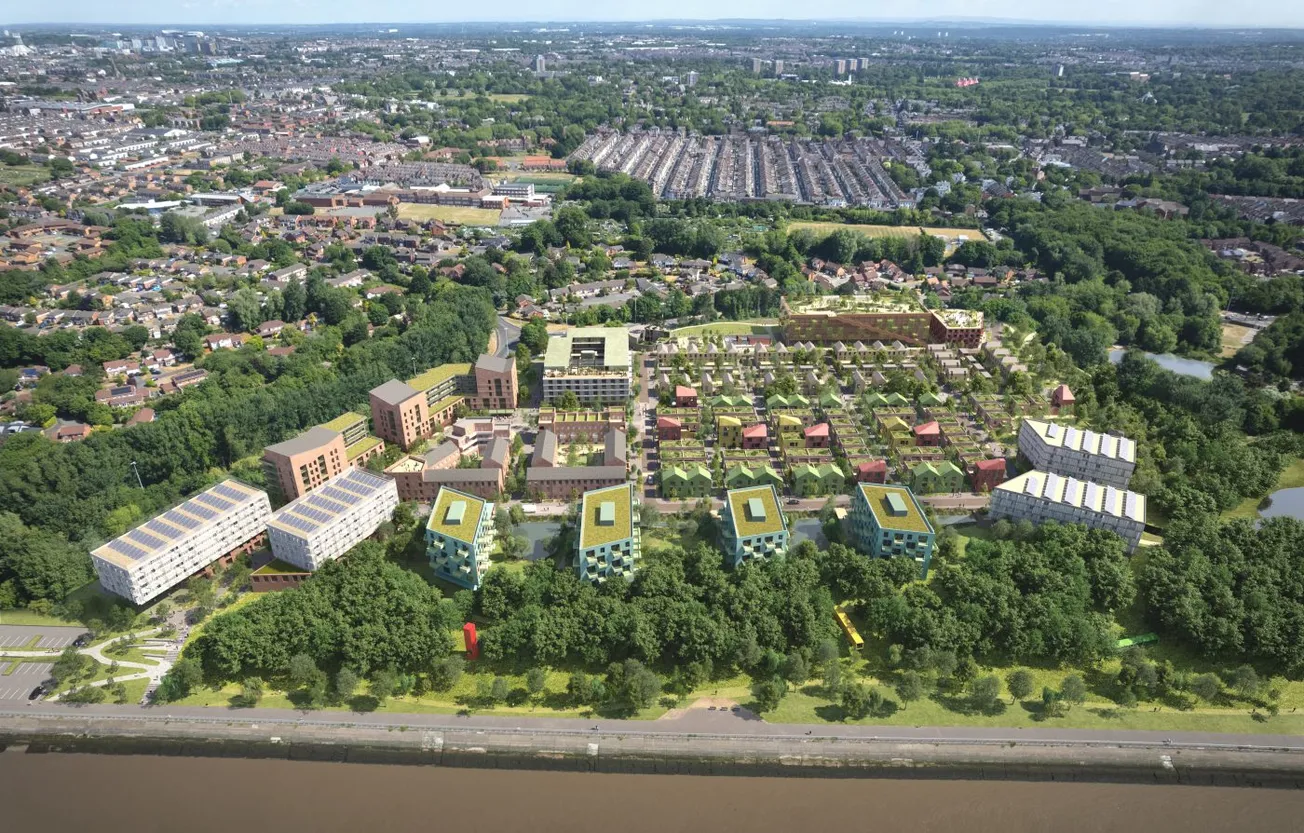Is Festival Gardens finally blossoming?

One of the city’s most famous stalled sites is being kicked into action. But what do people want from the development?
Dear readers — In 1984, Liverpool hosted the International Garden Festival, intended by “Minister for Merseyside” Michael Heseltine to be a balm for the city after the tumult of the early 1980s.
The festival itself was broadly considered a success. But far from leaving the intended legacy of riverside parkland, the site fell into disrepair. Liverpool City Council spent over £50 million to clean up the area, but subsequent schemes to build houses on the site — one of England's biggest brownfield plots — have not come to fruition.
Last week, a computer-generated image revealed what the completed Festival Gardens project on Liverpool’s waterfront might look like, accompanied by enthusiastic endorsements from Liverpool City Region mayor Steve Rotheram and council leader Liam Robinson. But as one Radio Merseyside journalist tweeted, the plans included “No mention of new schools, GPs surgery, shops or any additional infrastructure.”
Is this latest turn in the Festival Gardens saga a false dawn? Or do the city region and council know what they’re doing? For this latest edition of Answers in The Post — the series where we respond to queries from you, the readers — Abi Whistance dug into the Festival Gardens situation, turned over the soils of obfuscation and pulled the truth up by its roots.
Welcome to The Post. We’re Liverpool's quality newspaper, delivered entirely by email. Sign up to our mailing list and get two totally free editions of The Post every week: a Monday briefing, full of everything you need to know about that’s going on in the city; and an in-depth weekend piece.
No ads, no gimmicks: just click the button below and get our unique brand of local journalism straight to your inbox.
Your Post briefing
The long-awaited “Hillsborough Law” will include a “duty of candor” to compel public officials to tell the truth. The Public Office (Accountability) Bill was originally drafted following the 2016 inquest verdicts but was delayed by the 2017 general election. Subsequent governments chose not to implement it, while the present Labour government had pledged to introduce the bill in time for the anniversary of the Hillsborough disaster in April. Concerns about the law being watered down seem to have been sated for now, with both victims’ families and the lawyers who helped draft the original bill responding positively. Margaret Aspinall, whose son James died at Hillsborough beginning her decades of campaigning for justice, said she was hopeful the law "will mean no-one will ever have to suffer like we did". To read our recent interview with West Derby MP Ian Byrne, who tried to introduce the original version of the law into parliament earlier this year, click here.
Liverpool city council (LCC) says it has suffered repeated attacks by Russian state-funded cyber hackers in the last two years. The council’s report claimed it had received "significant attention" from the Noname057(16) group, “a state-linked Russian hacktivist group that attacks western targets, mostly government, military, transport and health.” However, the report also said the council had not suffered a successful ransomware attack — attempts to extort money by disabling IT services — for nine years. The report said the authority was utilising various methods "to reduce the effect of attack on our web infrastructure".
And perhaps inspired by the Russian state, LCC and Merseyside Police could soon be issuing £1,000 fines to anyone swearing, wearing masks or gathering in groups of more than six. The city leaders and police said the Public Space Protection Order (PSPO) would not be an attempt to limit people's right to peaceful protest but is a response to complaints from shopkeepers, members of the public and tourists about anti-social behaviour. The draft of the order makes it an offence to "swear at, verbally abuse or gesticulate at another person in such a manner as to cause, or be likely to cause, them to feel intimidated, harassed, alarmed or distressed", cover their face except with “specific items of personal clothing which reflect the individual's cultural values” or those “addressing legitimate medical needs, personal safety or other lawful purpose”, and to "be part of a group or gathering of six or more persons behaving in a manner which causes, or is likely to cause, harassment alarm or distress to another person".
In today’s Answers in The Post, we’re digging into the development of Festival Gardens, and its long history as a stalled site.
Liverpool deserves great journalism. You can help make it happen.
You're halfway there, the rest of the story is behind this paywall. Join the Post for full access to local news that matters, just £7/month.
SubscribeAlready have an account? Sign In

Latest
A postcard from Colwyn Bay
Fountains, Ffrith and turning the place over
Just what is happening with Peak Cluster’s CO₂ pipeline?
A ‘stitch up’? How Wirral council bungled Big Heritage
Is Festival Gardens finally blossoming?
One of the city’s most famous stalled sites is being kicked into action. But what do people want from the development?